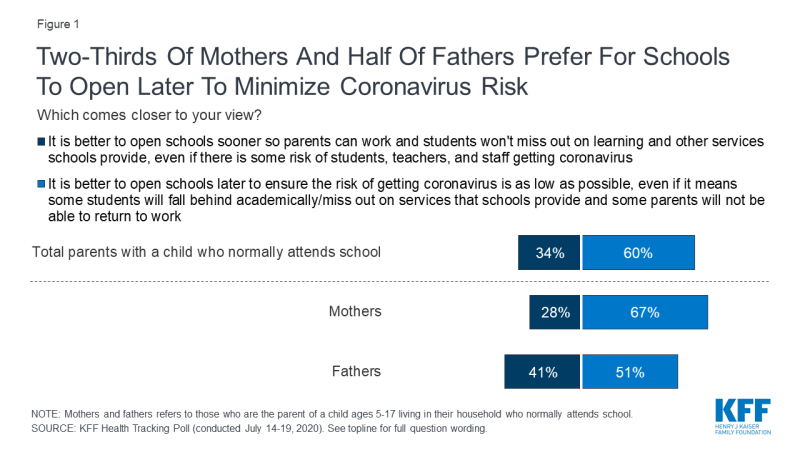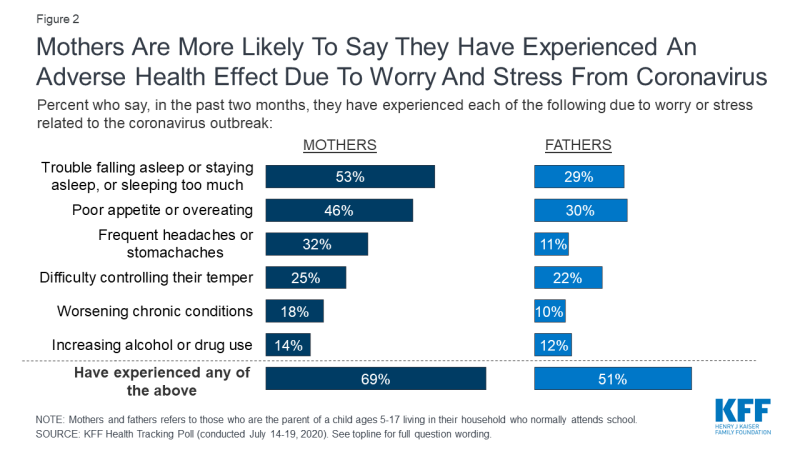It’s Back-to-School amid COVID-19, and Mothers Especially Are Feeling the Strain
Lunna Lopes, Cailey Muñana, and Liz Hamel
Published:
Since the coronavirus pandemic hit the United States, KFF has been tracking the firsthand experiences of people and how they’re coping with the virus and the changes it has brought about in their lives. Parents face a unique set of challenges as they attempt to balance the needs of their children – especially their schooling – with their own concerns about work, finances, and health. With the new school year approaching, the July KFF Tracking Poll explored parents’ concerns and preferences related to school reopening decisions. This new analysis finds a gender gap in parents’ worries and their views on schools returning for in-person instruction, as well as the reported toll of coronavirus-related stress on their mental health and wellbeing.
Most parents of children ages 5-17 who normally attend school think it’s better to open schools later to minimize the risk of coronavirus transmission (60%), while fewer think it’s better for schools to open sooner so parents can work and students won’t miss out on learning and other services (34%). However, while mothers prefer to delay reopening by more than a 2-to-1 margin (67% vs. 28%), fathers are more narrowly divided (51% think schools should open later and 41% think they should open sooner).

Figure 1: Two-Thirds Of Mothers And Half Of Fathers Prefer For Schools To Open Later To Minimize Coronavirus Risk
This gender gap in preferences regarding school reopening reflects a higher level of worry about the risks of reopening expressed by mothers compared with fathers. Mothers are more likely than fathers to say they are worried about the health and safety of their child, family members, or other people at school if their child were to return to school in-person. More than eight in ten mothers say they are “very worried” or “somewhat worried” that the teachers and staff at their child’s school will get sick from coronavirus (85%) and that kids at the school will be unable or unwilling to adhere to physical distancing guidelines (82%), and about three in four mothers worry that their child (77%) or someone in their family (77%) will get sick from coronavirus if their child returns to school in-person, or that the school will be unable to comply with public health recommendations (73%). While a majority of fathers are also worried about each of these potential outcomes, the shares of mothers expressing worry is between 15 to 21 percentage points higher than the share of fathers who say the same.
| Table 1: Worries about schools reopening among mothers and fathers | |||
| Percent who say they are “very worried” or “somewhat worried” about each of the following if their child DOES return to school in-person: | All parents with a child who normally attends school | Mothers | Fathers |
| Teachers and other staff at school getting sick from coronavirus | 79% | 85%* | 70% |
| Children at the school being unable or unwilling to comply with physical distancing practices | 73 | 82* | 61 |
| Their child getting sick with coronavirus | 70 | 77* | 61 |
| They or someone else in their family getting sick from coronavirus | 69 | 77* | 58 |
| Their child’s school being unable to comply with public health recommendations | 66 | 73* | 56 |
| Note: Asterisk indicates a statistically significant difference (p<0.05) between mothers and fathers. | |||
The divide between worried mothers and fathers is less pronounced when asked about the potential consequences on their child and work situation if their child does not return to school in-person. Similar shares of mothers and fathers say they are worried about their child falling behind socially, emotionally and academically, as well as not being able to give their child enough attention or losing income from not being able to work. However, mothers are nearly twice as likely as fathers to worry about their child having enough to eat at home and having access to necessary technology for their child to learn at home. This could, in part, be attributed to the fact that mothers are more likely than fathers to report having a household income of less than $40,000 and to say that they are currently unemployed.
| Table 2: Worries about schools remaining closed among mothers and fathers | |||
| Percent saying they are “very worried” or “somewhat worried” about each of the following if their child DOES NOT return to school in-person: | All parents with a child who normally attends school | Mothers | Fathers |
| Their child falling behind on their emotional and social development | 67% | 65% | 70% |
| Their child falling behind academically | 65 | 65 | 66 |
| Losing income if they are unable to work outside the home | 51 | 57 | 43 |
| Not being able to pay enough attention to their child if they are working from home | 47 | 46 | 49 |
| Their child not getting needed social services they usually get at school | 40 | 40 | 39 |
| Their child not having access to the technology needed for online learning | 31 | 38* | 21 |
| Their child not having enough to eat at home | 24 | 30* | 16 |
| Note: Asterisk indicates a statistically significant difference (p<0.05) between mothers and fathers. | |||
These school-related worries and concerns may be contributing to strains on the mental health and wellbeing of parents. At least one-fourth of parents with children who normally attend school, regardless of gender, say that worry and stress related to coronavirus has had a “major” negative impact on their mental health (35% of mothers vs. 26% of fathers). Furthermore, when asked whether they have experienced specific adverse effects due to worry and stress related to coronavirus, mothers in particular reported struggling with several signs of anxiety and stress. Mothers were more likely than fathers to say they have experienced difficulty sleeping, poor appetite or overeating, and frequent headaches and stomachaches. And, while large shares of parents across the board say they’ve dealt with at least one of several issues, more than two-thirds of mothers (69%) say they’ve experienced any adverse health effect over the past two months compared to half of fathers (51%). This mirrors the gender gap more broadly as nearly six in ten (58%) women say they’ve experienced any of these adverse health effects, whereas 46% of men say the same.

Figure 2: Mothers Are More Likely To Say They Have Experienced An Adverse Health Effect Due To Worry And Stress From Coronavirus
With many states continuing to report high numbers of coronavirus cases and deaths, parents are facing a number of worries about the wellbeing of their children, their families, and their communities. Mothers are particularly likely to report these worries, and to say that coronavirus-related stress is taking a toll on their own mental health and wellbeing. This gender gap between mothers and fathers may be due to long-standing differences in gender roles in households where women are more likely to be in charge of caring for their children, including their schooling. With some schools around the country already returning for in-person classes in early August, and others beginning distance learning, the added stress on parents is not likely to abate any time soon.
